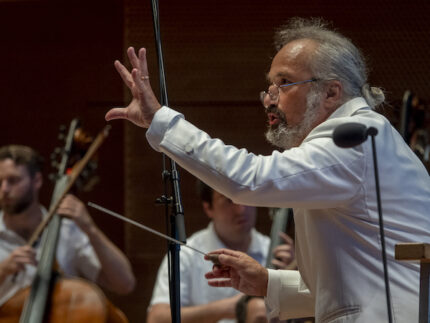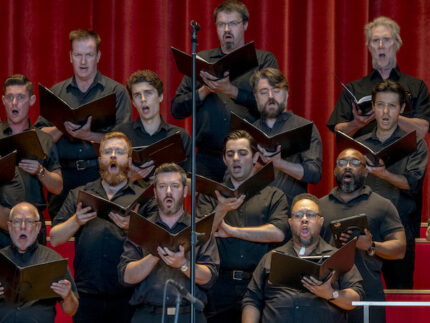Two contrasted yet equally moving meditations on loss at Grant Park Music Festival

The trend at summer music festivals is to favor relatively light and accessible repertoire. Friday’s Grant Park Orchestra concert was an exception to this rule, with artistic director Carlos Kalmar leading two serious and starkly contrasting meditations on loss.
The first of these was Joel Thompson’s Seven Last Words of the Unarmed, a 2014 work heard in its festival premiere. Thompson’s work riffs off the many musical settings of the Seven Last Words of Christ (notably Haydn’s), but uses as its text the last words of seven unarmed black men killed, mostly by police.
Each final utterance is given its own movement, and with the entire work lasting a taut fifteen minutes, are worked over with great urgency. “Officers, why do you have your guns out?” (Kenneth Chamberlain) begins in murky cello depths from which the male chorus emerges, rises, and dies away. The more anxious “Why are you following me?” (Trayvon Martin) is punctuated with a guttural final shout. “Mom, I’m going to college” (Amadou Diallo) and “It’s not real” (John Crawford) tap into the victims’ aborted hopes, with more melodic writing and rich choral harmonies.
The chorus shouts the lines of “I don’t have a gun! Stop shooting!” (Michael Brown) and clap their hands to their chests in “You shot me. You shot me!” (Oscar Grant III), pantomiming the murder in a visceral fashion as they hiss Grant’s words. “I can’t breathe!” (Eric Garner) closes the work on a bitter note, with a deafening percussion crescendo followed by a diminuendo to nothing depicting death from lack of air.

Thompson’s score packs an undeniable punch. Orchestral performances seldom confront one so directly and forcefully with current social issues. Given Thompson’s clear talent for vividly capturing a variety of moods, one occasionally wished that some of his ideas were worked out at greater length than the two or so minutes allotted to each movement, though this brevity also adds to the work’s impact.
Kalmar did not shy away from the score’s intensity, while also bringing out its nuance and texture. His pious and awkward request that the audience refrain any applause was predictably not heeded, though there were no bows and he gestured for quiet as he left the stage.
After that, the second half’s exceptional performance of Brahms’ A German Requiem felt like it offered the possibility of healing and consolation. The Grant Park Orchestra Chorus were at their considerable finest with director Christopher Bell’s preparation, singing with refinement and impeccable balance from first to last, while also bringing a unified force to bear in the rare moments that call for it in the work. They floated the delicate lines of “Wie lieblich sind deine Wohnungen” with collective grace, and the concluding “Selig sind die Toten” had the reflective pathos of a genuine leave-taking.
The vocal soloists were equally stellar. Baritone Hugh Russell sang the lamenting “Herr, lehre doch mich” with a robust, rich timbre, to which the chorus responded in kind, and was similarly stirring in “Denn wir haben hie.” Soprano Maeve Höglund sang with pure, elegant tone in “Ihr habt nun Traurigkeit,” Brahms’ moving response to the loss of his mother.
Kalmar brought pacing and structure to Brahms’ teeming complexities, making a pillowy orchestral accompaniment for the chorus while injecting staunch vigor into Brahms’ fugues. Most importantly, he captured the score’s ambivalence, shifting between the pain of loss and the possibility of earthly solace.
The program will be repeated 7:30 p.m. Saturday. grantparkmusicfestival.com
Posted in Performances



Posted Jul 22, 2023 at 2:05 pm by Odradek
“Orchestral performances seldom confront one so directly and forcefully with current social issues”
For good reason. Classical music due to its abstract nature is bad at dealing with political topics. Even when a master like Shostakovich tried to do it, the result was one-sided “poster music” (example: the 12th Symphony). From the description, the Thompson work sounds like a forgettable piece of agitprop.
Posted Jul 22, 2023 at 9:03 pm by Anonymous
Perhaps Odradek should take a listen to the Thompson prior to passing judgement on its impact or merit. It is anything but forgettable. The only piece of agitprop is Odradek’s comment – it seems he is the one with propaganda to spread.
Posted Jul 23, 2023 at 1:16 am by Carlos Lopez
It was OUTSTANDING. I was really surprised by Thompson’s work and enjoyed it very much. But the Brahm’s Requiem captivated me and my Family.
Thank you very much Chicago for this fantastic experience !!!